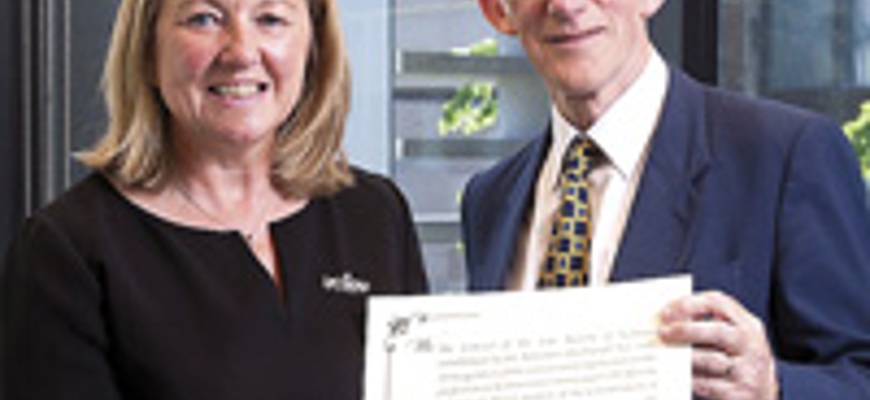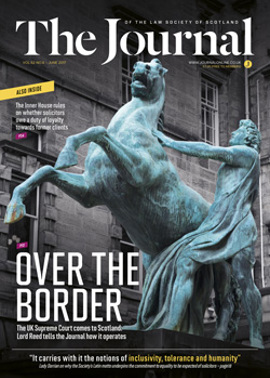Thoughts on a frenetic year

Scottish solicitors will once again pay an unchanged practising certificate fee in 2017-18, the annual general meeting of the Law Society of Scotland confirmed.
A proposal to hold the fee at £550 for the eighth year running was passed without opposition at the meeting, held at the Society’s offices on 25 May. It also approved without debate an amendment to the Society’s constitution to permit Council to co-opt up to eight members rather than the present six (to allow further representation of interest groups, beginning with Scottish solicitors working overseas), and proposals to amend the rules about qualifying as a solicitor advocate to change the order in which the different stages in the process are completed, following consultation with the Lord President.
President’s “challenging and fulfilling” term
Giving her address, the President, Eilidh Wiseman, on the eve of completing her term of office, said it had been some of the most challenging and fulfilling months of her career. She could not claim to have relished the dispute with the Scottish Legal Complaints Commission, or enjoyed the frustration at its “unjustified” levy increase, but “I take unqualified pride in the committed, innovative and dignified approach we took to fighting our members’ corner.” She was also “shocked and disappointed” by the lack of respect shown to legal aid practitioners and the ever-decreasing investment in their services. “But against the odds the profession continues to put clients’ needs first.”
One fulfilling occasion had been the previous week when Edinburgh hosted the plenary meeting of the CCBE, under its current Scottish President Ruthven Gemmell, despite the uncertainty created by the Brexit vote. Her travels both abroad and within Scotland had also been a highlight, and she valued the latter just as highly as the former, with its chance to meet new people and understand their points of view.
She was also proud of the Society’s initiatives to encourage future generations of lawyers, including Street Law and the Lawscot Foundation, which latter had received numerous applications from would-be mentors as well as from students seeking to benefit. Its “incredible progress” over its first year had been a real highlight.
Chief executive: plan advances
Chief executive Lorna Jack followed up by reporting that the Society was well into the second year of its five-year strategic plan. The new category of student affiliate membership had been added with more than 1,000 signing up, and other categories were planned. The conduct complaints investigation, client protection and intervention teams were all achieving excellent levels of performance, and the change of Master Policy insurance broker had gone well, despite some members’ concerns ahead of the event. The Society had achieved some exemptions for solicitors from the forthcoming regulation of letting agents through meetings with Scottish Government, and would be pressing its case for other reforms with the independent reviews of professional regulation and of legal aid.
Since the Brexit vote the Society had been extremely busy, running events and engaging with key decision-makers at all levels in order to raise the profession’s priorities.
“Switching into other areas,” she continued, “we have refreshed and restructured our CPD offering, meaning that members now have even greater choice of what they learn, how they learn and when they learn, all of that based on feedback and consultation with you, our members. If you have not recently looked at what we have on offer I encourage you to do so. You will find some fascinating and relevant content there.”
She concluded: “I am immensely proud of what my colleagues and committee and Council members achieve every day, and I would like to take this opportunity to publicly thank them.”
Ward’s award
Before the formal business, the meeting saw pioneering mental health and adult incapacity solicitor Adrian Ward MBE presented with life membership of the Society for his achievements. Ward, who spent most of his career (he enrolled in 1967) in the Barrhead office of the firm nearest to his parents, said that some might think his life “rather dull”; he had simply done whatever work came his way, and in relation to his incapacity work, he had “used the genius of Scots law to get remedies in court, and keep ahead of the game”.
Quoting a Dutch Second World War resistance fighter who said: “Where law ends, Hell begins”, he added: “The first Hell is that of vulnerable people” – referring to the conditions in which they often live, and their struggle to achieve equality before the law.
He concluded by saying that of all the accolades he had received, he valued this one “far above all the others”.
In this issue
- Neutrality policies in commercial companies
- Court IT: the young lawyers' view
- Human rights: answering to the UN
- Galo and fair trial: which way for Scotland?
- Secondary victims in clinical negligence
- Reading for pleasure
- Opinion: Alan W Robertson
- Book reviews
- Profile
- President's column
- Twin tracks to completion
- People on the move
- Court of the nations
- Second time around
- How to avoid a summer tax scorcher
- Humani nihil alienum: a call to equality
- Sheriff commercial procedure: count 10
- Taking a pay cut: fair to refuse?
- Fine to park here?
- Enter the Bowen reforms
- Home grown
- Limited partnerships: a new breed
- Salvesen fallout: the latest round
- Gambling in football – the Scottish perspective
- Scottish Solicitors' Discipline Tribunal
- Changing sides
- Business drivers
- CCBE comes to Edinburgh
- "Find a solicitor" gets an upgrade
- Law reform roundup
- Thoughts on a frenetic year
- Check those bank instructions
- Fraud alert – ongoing bank frauds identified
- AML: sizing up the risk
- Master Policy Renewal: what you need to know
- Without prejudice
- What's the measure of a ruler?
- Ask Ash






